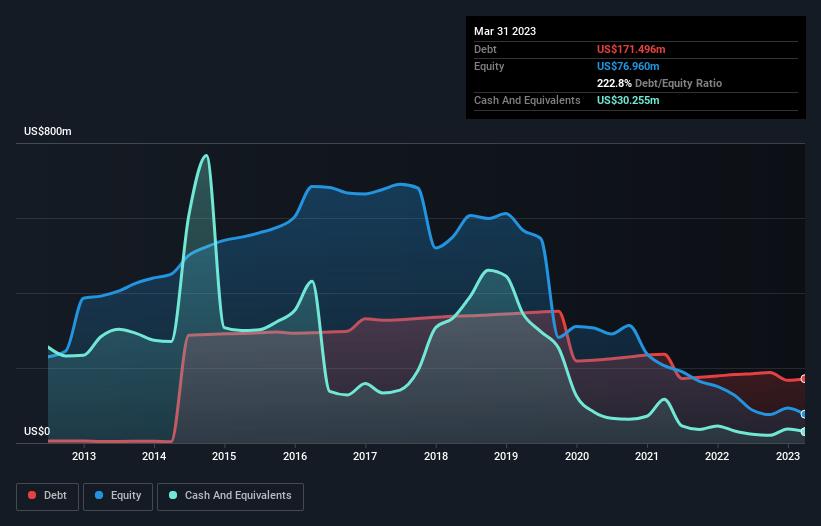
Some say volatility, rather than debt, is the best way to think about risk as an investor, but Warren Buffett famously said that 'Volatility is far from synonymous with risk.' So it seems the smart money knows that debt - which is usually involved in bankruptcies - is a very important factor, when you assess how risky a company is. Importantly, Acorda Therapeutics, Inc. (NASDAQ:ACOR) does carry debt. But the more important question is: how much risk is that debt creating?
Why Does Debt Bring Risk?
Debt is a tool to help businesses grow, but if a business is incapable of paying off its lenders, then it exists at their mercy. Ultimately, if the company can't fulfill its legal obligations to repay debt, shareholders could walk away with nothing. However, a more common (but still painful) scenario is that it has to raise new equity capital at a low price, thus permanently diluting shareholders. Of course, the upside of debt is that it often represents cheap capital, especially when it replaces dilution in a company with the ability to reinvest at high rates of return. The first thing to do when considering how much debt a business uses is to look at its cash and debt together.
View our latest analysis for Acorda Therapeutics
What Is Acorda Therapeutics's Debt?
The image below, which you can click on for greater detail, shows that Acorda Therapeutics had debt of US$171.5m at the end of March 2023, a reduction from US$182.4m over a year. However, it also had US$30.3m in cash, and so its net debt is US$141.2m.

How Healthy Is Acorda Therapeutics' Balance Sheet?
We can see from the most recent balance sheet that Acorda Therapeutics had liabilities of US$34.7m falling due within a year, and liabilities of US$263.2m due beyond that. Offsetting this, it had US$30.3m in cash and US$9.19m in receivables that were due within 12 months. So it has liabilities totalling US$258.5m more than its cash and near-term receivables, combined.
Given this deficit is actually higher than the company's market capitalization of US$244.4m, we think shareholders really should watch Acorda Therapeutics's debt levels, like a parent watching their child ride a bike for the first time. Hypothetically, extremely heavy dilution would be required if the company were forced to pay down its liabilities by raising capital at the current share price. The balance sheet is clearly the area to focus on when you are analysing debt. But it is Acorda Therapeutics's earnings that will influence how the balance sheet holds up in the future. So if you're keen to discover more about its earnings, it might be worth checking out this graph of its long term earnings trend.
In the last year Acorda Therapeutics had a loss before interest and tax, and actually shrunk its revenue by 3.6%, to US$118m. That's not what we would hope to see.
Caveat Emptor
Importantly, Acorda Therapeutics had an earnings before interest and tax (EBIT) loss over the last year. Its EBIT loss was a whopping US$35m. Considering that alongside the liabilities mentioned above make us nervous about the company. We'd want to see some strong near-term improvements before getting too interested in the stock. Not least because it burned through US$14m in negative free cash flow over the last year. That means it's on the risky side of things. When analysing debt levels, the balance sheet is the obvious place to start. However, not all investment risk resides within the balance sheet - far from it. For example, we've discovered 1 warning sign for Acorda Therapeutics that you should be aware of before investing here.
If you're interested in investing in businesses that can grow profits without the burden of debt, then check out this free list of growing businesses that have net cash on the balance sheet.
New: Manage All Your Stock Portfolios in One Place
We've created the ultimate portfolio companion for stock investors, and it's free.
• Connect an unlimited number of Portfolios and see your total in one currency
• Be alerted to new Warning Signs or Risks via email or mobile
• Track the Fair Value of your stocks
Have feedback on this article? Concerned about the content? Get in touch with us directly. Alternatively, email editorial-team (at) simplywallst.com.
This article by Simply Wall St is general in nature. We provide commentary based on historical data and analyst forecasts only using an unbiased methodology and our articles are not intended to be financial advice. It does not constitute a recommendation to buy or sell any stock, and does not take account of your objectives, or your financial situation. We aim to bring you long-term focused analysis driven by fundamental data. Note that our analysis may not factor in the latest price-sensitive company announcements or qualitative material. Simply Wall St has no position in any stocks mentioned.
About OTCPK:ACOR.Q
Acorda Therapeutics
A biopharmaceutical company, develops and commercializes therapies for neurological disorders in the United States.
Slight and slightly overvalued.

